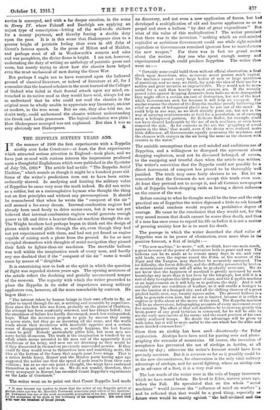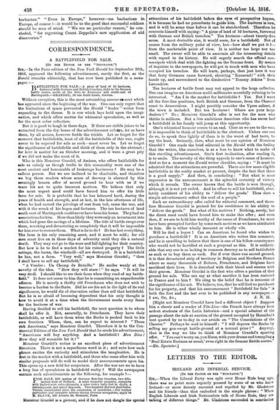THE ZEPPELIN SIXTEEN YEARS AGO.
IN the summer of 1900 the first experiments with a Zeppelin airship over Lake Constance—at least, the first experiments which attracted serious attention in England—took place, and we have just re-read with curious interest the impressions produced upon a thoughtful Englishman which were published in the Spectator of July 7th, 1900.* The article had as title "The Zeppelin Aerial Machine," which sounds as though it might be a hundred years old. Some of the writer's predictions turn out to have been extra- ordinarily shrewd. In analysing and limiting the military value of Zeppelins he came very near the mark indeed. He did not write as a soldier, but as a contemplative layman who thought the thing out on first principles and without any preconceptions. It should be remembered that when he wrote the "conquest of the air" still seemed a far-away dream. Internal-combustion engines had already been used freely to drive motor-cars, but it was not yet believed that internal-combustion engines would generate enough power to lift and drive a heavier-than-air machine through the air. The Wright brothers had perhaps begun to think out the design of planes which would glide through the air, even though they had not yet experimented with them, and had not yet found an engine capable of raising such a plane from the ground. So far as men occupied themselves with thoughts of aerial navigation they pinned their faith to lighter-than-air machines. The steerablo balloon was well within the imaginative reach of every man, and hardly any one doubted that if the "conquest of the air" came it would come by means of "dirigibles."
It is entertaining now to look at the spirit in which the question of flight was regarded sixteen years ago. The opening sentences of the article reflect the doubting and genially unconcerned temper of the moment. The sagacity with which the writer proceeded to place the Zeppelin in its order of importance among military appliances was, however, all the more remarkable by contrast. He began thus :—
" The interest taken by human beings in their own efforts to fly, or rather to travel through the air, is untiring and incurable by experience. Ever since the first kite was flown, probably on the plains of Chaldaea, the attempt has been constantly renewed, and has always failed ; but the steadiness of failure has hardly discouraged, much less extinguished, hope. What the inventors propose to gain by success they rarely or never state, but they go on inventing all the same, and the world reads about their inventions with insatiable appetite and a certain sense of disappointment when, as usually happens, the last Icarus comes to grief. Nobody particularly pities him, but most men are sorry for his ill-success. The truth is the imagination is touched by an effort which seems intended to lift man out of the apparently lined conditions of his being, and men are set dreaming as they would be if they discovered in themselves previously unrevealed powers. If they could fly they would seem to themselves men and something more, the idea at the bottom of the fancy that angels must have wings. That is a rather ieeble fancy, Homer and the Hindoo poets having ages ago suggested the nobler one that the speed of gods results from their own volition ; but as no one can paint a thought, the wings have enshrined themselves in art, and so live on. We do not wonder, therefore, that every newspaper in Europe has recorded Count Zeppelin's experiments on the Lake of Constance."
The writer went on to point out that Count Zeppelin had made
• It may interest our readers to know that the writer of our Zeppelin article of sixteen years ago was Mr. Meredith Townsend, sometime joint-editor of the Spectator. Mr. Townsend was one of the most memorable journalists of his day, whether judged by the animation of his style or the brilliancy of his imagination. Ills mind took With ease the broadest of broad Jam" no discovery, and not even a new application of forces, but had developed a multiplication of old and known appliances so as to propel and steer a balloon "by dint of great expenditure." But what of the value of this multiplication ? The writer premised that there was in the invention "nothing which an evil-minded capitalist or ambitious Government could use while right-minded capitalists or Governments remained ignorant how to manufacture the new weapon." For there was in fact no grand secret about the matter. Any one who spent enough money and experimented enough could produce Zeppelins. The writer then went on :— " Certainly none could build them without official observation, a final check upon Anarchists, who, moreover, never possess much ospitaL The machines cannot carry large bodies of mon or largo quantities of munitions, and we may, we think, lay aside the idea of their use for a sudden and great invasion as impracticable. They would not be more useful for a raid than heavily armed cruisers are. If the recently passed rules against dropping dynamite from balloons wore disregarded they might effect a certain amount of destruction, but not of the kind which Governments seek for because it will help on coniuest. For similar reasons the chance of the Zeppelin machine greatly furthering the relief or storm of beleaguered places may be put out of the mind. It could help in one way, as we shall direotly point out, but not in the way of carrying reinforcements or fool for a population, or of carrying away a beleaguered garrison. Sir Redvers Buller, for example, could not have cleared Ladysmith by the use of such in whines, or even have removed the sick. As for contests in the air, the grappling of aerial navies in the blue,' that would, oven if the dream were realized, make little difference, all Governments equally possessing the machines, and the chances with cruisers in the air being the same as the chances with cruisers in the water."
The amiable assumptions that an evil-minded and ambitious use of Zeppelins, and a willingness to disregard the agreement about dropping explosives, need not be discussed belonged, of course, to the easygoing and trustful days when tho article was written. The writer's conviction that the Zeppelin could not possibly be a direct instrument of conquest has proved to be thoroughly well justified. The truth may seem fairly obvious to us. But let us remember that the Germane do not accept this truth even now. At least they pretend not to except it, and all German newspapers talk of Zeppelin bomb-dropping raids as having a direct influence on the course of the war.
Before coming to what he thought would be the true and the only practical use of Zeppelins the writer digressed a little to ask himself whether aerial combats would require a prohibitive degree of courage. He came to the conclusion that they would not, for the very sound reason that death cannot be worse than death, and that if a man has once come to regard his life as forfeit it is not a matter of pressing anxiety how he is to meet his death.
The passage in which the writer described the chief value of Zeppelins was in its power of elimination, oven moro than in its positive forecast, a feat of insight :— " The new machine," he wrote, "will, we think, have one main result, a great increase of the power of observation both in peace and war. The balloons can be so made as to remain many days in air, and very wild lands, even the regions round the Poles, or the sources of the Niger and the Yangtse, may therefore be accurately surveyed. The ice difficulty, the forest difficulty, and the diffioulty presented by broken or mountainous country will all alike be gradually overcome. Wo do not know that the happiness of mankind is greatly increased by such knowledge any more than it has been by the telegraph, but still it is a sort of duty to explore this little planet of ours, and the Zoppolin machine or an improvement on it will help us to perform the duty. And it will certainly alter one condition of warfare, as it will enable a besieger to see the Interior of a besieged city, and all the shifting chances of a groat pitched battle over, say, twenty square miles. The present balloon is a help to generals even now, but its use is limited, because it is either a captive or drifts about at the mercy of the wind. The Zeppelin machine will be an observatory, holiographing accounts of every movement every five minutes. The effect of that will doubtless be to increase greatly the brain-power of any good tactician in command, for he will be able to see the early movements of his enemy and the exact position of his own widely scattered troops. No doubt the advantage will be given to both aides, but it will be more useful to the one which has the abler and more decided commandant."
Since then an airship has been used—disastrously—for Polar exploration. Airships have been used for passing over and photo- graphing the summits of mountains. Of course, the invention of aeroplanes has prevented the use of airships in battles, at al events by day ; otherwise the writer's forecast would have been precisely accurate. But it is accurate so far as it possibly could be in the new circumstances, for observation is the only vital military advantage of airships, and for naval fighting, where an airship can go in advance of a fleet, it is a very real ono.
The last words of the writer were in the vein of happy innocence which we have noted before. He lived in Eden, sixteen years ago, before the Fall. He speculated that on the whole "aerial machines" would increase the "influence of mind on warfare" and he reflected that that would be a good thing, especially se future wars would be mainly against "the half-civilized and the
barbarian" "Even in Europe," however,--no barbarians in Europe, of course !—it would be to the good that successful soldiers should be men of mind. "We see no particular reason," he con- cluded, "for regretting Count Zeppelin's new application of old discoveries."



































 Previous page
Previous page